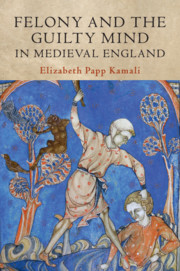Book contents
- Felony and the Guilty Mind in Medieval England
- Studies in Legal History
- Felony and the Guilty Mind in Medieval England
- Copyright page
- Dedication
- Contents
- Figures
- Acknowledgments
- A Note on the Text
- Abbreviations
- Introduction
- Part I Felonia Felonice Facta: Felony and Intentionality
- 1 The Meaning of Felony
- 2 Felony in the Archives
- Part II Þe Deuylys Doghtyr of Hellë Fyre: Felony and Emotion
- Part III Handlyng Synne: Guilt and Innocence
- Part IV Dies Iræ: Judge and Jury
- Conclusion
- Bibliography
- Index
2 - Felony in the Archives
from Part I - Felonia Felonice Facta: Felony and Intentionality
Published online by Cambridge University Press: 18 July 2019
- Felony and the Guilty Mind in Medieval England
- Studies in Legal History
- Felony and the Guilty Mind in Medieval England
- Copyright page
- Dedication
- Contents
- Figures
- Acknowledgments
- A Note on the Text
- Abbreviations
- Introduction
- Part I Felonia Felonice Facta: Felony and Intentionality
- 1 The Meaning of Felony
- 2 Felony in the Archives
- Part II Þe Deuylys Doghtyr of Hellë Fyre: Felony and Emotion
- Part III Handlyng Synne: Guilt and Innocence
- Part IV Dies Iræ: Judge and Jury
- Conclusion
- Bibliography
- Index
Summary
Chapter 2 relies upon descriptions of what jurors found not to be felonious to draw conclusions about the meaning of felony in the medieval English legal context. Perhaps because the law was not heavily theorized, or perhaps because these are complex matters with which we still struggle in modern jurisprudence, medieval English felony law was tested by particular circumstantial elements that made a simple guilt or innocence determination difficult for jurors to reach. The chapter’s discussion of the paradigm of felony relies primarily on analysis of the categories of accident, self-defense, insanity, infancy, and duress. This paradigm, unmistakably influenced by notions of mind rather than reflecting a mere category of criminal acts, might be summarized as follows: a crime involving deliberation and rationality, the exercise of a person’s will in the absence of countervailing necessity, and an act that was wrongful and perhaps essentially wicked. Surely not all felonies fit this paradigm, but a pattern does emerge from a close reading of the plea rolls alongside literary texts.
Keywords
- Type
- Chapter
- Information
- Felony and the Guilty Mind in Medieval England , pp. 49 - 90Publisher: Cambridge University PressPrint publication year: 2019

